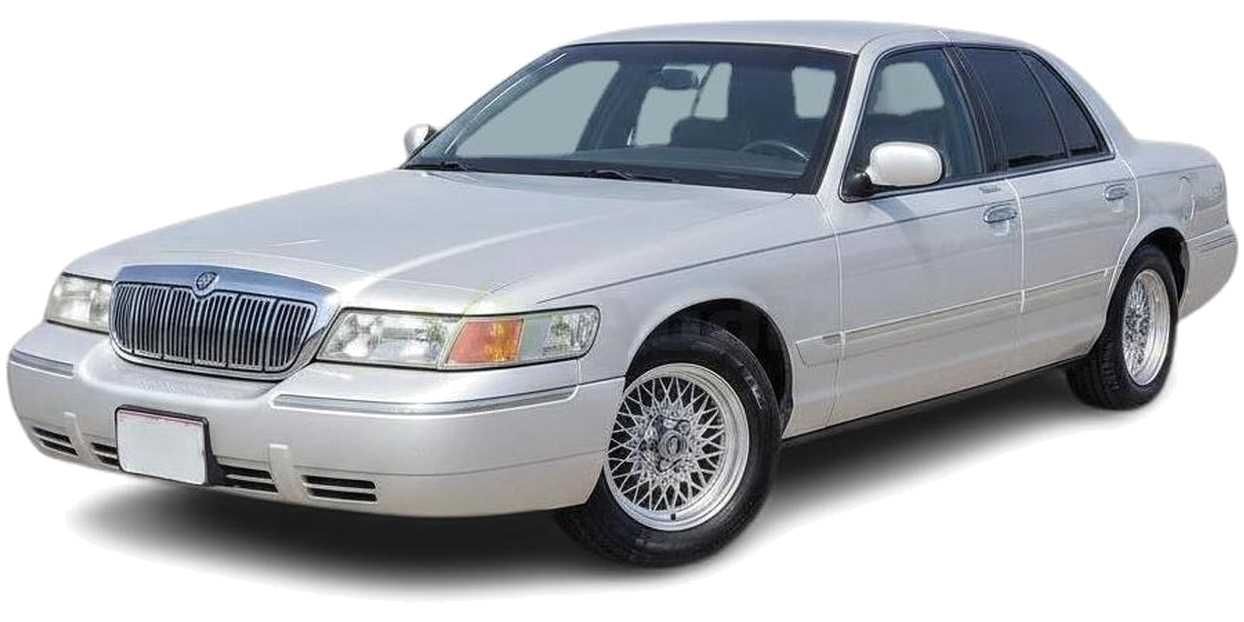The Good
The 2001 Grand Marquis offers exceptional comfort with its plush ride and vast interior, appealing to those seeking a relaxed driving experience. Its V8 engine provides ample, smooth power, while its legendary reliability and simple mechanics make it a practical, low-maintenance choice. Owners appreciate its "big car" feel, impressive value, and substantial trunk space, combining emotional nostalgia with practical everyday utility.
The Bad
Known weaknesses for the 2001 Grand Marquis include its somewhat dated exterior and interior design, which lacks modern flair. Its large size can make parking challenging, and fuel economy, while decent for its class, isn't stellar. Common issues to watch for include intake manifold cracks, blend door actuator failures, and aging suspension components.
2001 Mercury Grand Marquis: Quick Overview
- Engine Options: The 2001 Mercury Grand Marquis primarily came with one engine option: a 4.6-liter "Modular" SOHC V8. This engine was paired exclusively with a 4-speed automatic overdrive transmission.
- Horsepower: The 4.6L V8 produced 200 horsepower and 275 lb-ft of torque for the standard GS trim. For the LS trim equipped with dual exhaust, horsepower increased slightly to 215 hp, while torque remained at 275 lb-ft. This provided smooth, adequate power for daily driving and highway cruising, rather than exhilarating acceleration.
- Fuel Economy: Fuel economy figures were typical for a full-size V8 sedan of its era. EPA estimates were approximately 17 MPG in the city and 24 MPG on the highway for both trims. These numbers reflect its weight and engine displacement.
- 0-60 Times: The 0-60 mph acceleration for the 2001 Grand Marquis generally ranged from about 8.5 to 9.5 seconds, depending on the specific trim and conditions. While not quick by modern standards, it was respectable for a large, comfort-oriented sedan.
- Towing Capacity: The 2001 Grand Marquis had a decent towing capacity, typically rated around 2,000 to 3,500 pounds when properly equipped with an optional towing package. This made it capable of light-duty towing for small trailers or boats.
- Trim-Level Features:
- GS Trim: This base model included features such as power windows and locks, air conditioning, cruise control, a tilt steering wheel, and an AM/FM stereo with cassette. It offered comfortable cloth seating and a spacious interior.
- LS Trim: The more upscale LS trim added several luxury and convenience features. These often included automatic climate control, a power-adjustable driver's seat (sometimes passenger also), a premium audio system with a CD player, remote keyless entry, alloy wheels, and a leather-wrapped steering wheel. Optional features on the LS could include leather seating surfaces, heated seats, traction control, and a power moonroof. It also featured upgraded exterior trim and sometimes a more refined suspension tuning for an even smoother ride.
2001 Mercury Grand Marquis Specifications
Vehicle Information
| Year | 2001 |
| Make | Mercury |
| Model | Grand Marquis |
| Trim | - |
| Style | - |
| Type | Sedan |
| Category | Compact Car |
Manufacturing Details
| Made In | Canada |
| Manufacturing City | WIXOM |
Dimensions
| Doors | 4-Door |
| Curb Weight | - |
| Gross Vehicle Weight Rating | - |
| Overall Height | - |
| Overall Length | - |
| Overall Width | - |
| Wheelbase Length | - |
| Standard Seating | - |
Engine & Performance
| Engine | 4.6L V8 |
| Engine Size | 4.6L |
| Engine Cylinders | 8 |
| Transmission | - |
| Transmission Type | - |
| Transmission Speeds | - |
| Drivetrain | 2 Wheel Drive |
Additional Features
| Anti-Brake System | - |
| Steering Type | - |
Pricing
| Manufacturer Suggested Retail Price (MSRP) | - |
| Invoice Price | - |
| Delivery Charges | - |
Vehicle History Report
Specifications
History
Events
History Check
Check
Check
Check
Check
Listings
Recalls
Check
Analysis
What Problems Does the 2001 Mercury Grand Marquis Have?
One of the most widely cited issues for the 4.6L V8 engine from this era is a faulty plastic intake manifold, specifically the crossover tube design. These manifolds are prone to cracking, often near the thermostat housing or fuel injector bosses, leading to coolant leaks and potential engine overheating. Ford eventually redesigned this part with an aluminum crossover, and many vehicles have likely had this replaced. When purchasing, it's crucial to check for evidence of this repair or signs of leaks.
Another common problem involves the blend door actuator for the climate control system. This component is known to fail, resulting in improper air temperature control (e.g., only hot air or only cold air) and can be a labor-intensive repair due to its location behind the dashboard.
Suspension components are also a common area of wear over time. Bushings, ball joints, and tie rods can wear out, leading to clunking noises, loose steering, or uneven tire wear. While not catastrophic, these require attention for optimal ride quality and safety. Rear air suspension, if equipped (often on LS models), can fail over time, resulting in a sagging rear end. Many owners convert to traditional coil springs rather than repairing the air suspension.
Electrical issues can surface with age, such as power window regulators failing, instrument cluster lights burning out, or issues with the digital odometer display. Starter motors are also known to fail. Rust can become a concern in areas where road salt is used, particularly on the frame, brake lines, and rocker panels.
Regarding recalls for the 2001 model year, there was a recall (NHTSA Campaign ID 01V281000) related to the headlamp switch. The switch could overheat and potentially cause a fire, prompting owners to have it inspected and replaced if necessary. Another recall (NHTSA Campaign ID 01V077000) involved the lower control arm mounting bolts, which could loosen over time, leading to steering issues. It's always advisable to check a specific vehicle's VIN for any open recalls.
How long will the 2001 Mercury Grand Marquis last?
However, long-term weaknesses include the aforementioned plastic intake manifold, which is almost guaranteed to fail if not already replaced. Suspension components like ball joints, tie rods, and bushings will require replacement over time, as will the rear air suspension if equipped. Electrical gremlins like blend door actuators and power window motors are also common age-related issues. Rust can be a significant factor in colder climates. Despite these, the core powertrain and chassis are remarkably resilient, making it a viable long-term vehicle if these known issues are addressed.
What Technology & Safety Features are Included?
Entertainment: Standard entertainment typically included an AM/FM stereo with a cassette player in the GS trim, while the LS often upgraded to an AM/FM stereo with a single-disc CD player. A premium sound system was sometimes an available option on the LS, offering slightly better audio quality. Steering wheel-mounted audio controls were also available on higher trims, a convenience feature for the era.
Driver-Assistance: Driver-assistance features were minimal by today's standards. Cruise control was standard or widely available, providing basic highway driving assistance. Traction control was an optional feature, primarily offered on the LS trim, which helped prevent wheel spin in slippery conditions. Rear parking sensors were not typically available in this model year.
Safety Features: The 2001 Grand Marquis came equipped with standard safety features including dual front airbags, anti-lock brakes (ABS), and a robust body-on-frame construction designed to absorb impact. Three-point seatbelts were standard for all outboard passengers. The vehicle's large size and weight inherently offered a sense of security in collisions.
Optional Features: Beyond the standard and trim-level specific items, common optional features that enhanced comfort and convenience included leather seating surfaces, heated front seats, a power moonroof, automatic climate control, and a digital instrumentation cluster. The towing package, including a heavy-duty frame and often an upgraded cooling system, was also a popular option.
Crash-Test Ratings: The 2001 Mercury Grand Marquis, being part of the Panther platform, generally performed well in crash tests for its time. According to the National Highway Traffic Safety Administration (NHTSA):
- Frontal Crash Test (Driver): 5 out of 5 stars
- Frontal Crash Test (Passenger): 5 out of 5 stars
- Side Impact Test (Front): 5 out of 5 stars
- Side Impact Test (Rear): 5 out of 5 stars
What Colors Options are Available?
2001 Mercury Grand Marquis Prices and Market Value
Today, current used market prices vary significantly depending on condition, mileage, and region. Well-maintained examples with lower mileage might fetch $3,000 to $6,000. Higher mileage or cosmetically challenged models can be found for under $2,000. This vehicle has experienced substantial depreciation, as is common for large, non-luxury sedans from that era, especially those without a strong enthusiast following or unique features. Factors affecting resale value include the overall physical condition, rust presence, maintenance history, and the working order of all power accessories. Originality and specific options like leather or air suspension generally don't add significant value in today's market unless the car is in pristine, collector-grade condition.
2001 Mercury Grand Marquis Cost of Ownership
2001 Mercury Grand Marquis Fuel Efficiency
2001 Mercury Grand Marquis Safety Rating
NHTSA
2001 Mercury Grand Marquis Insurance
reasonable repair costs.
How Does the 2001 Mercury Grand Marquis Compare to Other Sedan?
Performance: Compared to rivals like the Chevrolet Impala (front-wheel drive, V6 or limited V8 options) or Buick LeSabre (front-wheel drive, V6 only), the Grand Marquis offered a more robust, rear-wheel-drive V8 powertrain. While not a performance car, its 4.6L V8 delivered smoother, more relaxed power than most V6 rivals and felt more substantial. Rivals like the Impala SS or Pontiac Bonneville GXP offered more spirited handling but often at the expense of ride comfort.
Features: The Grand Marquis, especially in LS trim, offered a comfortable interior with amenities like power seats, automatic climate control, and a CD player. While it lacked the advanced tech of some imports like the Toyota Avalon (which offered a more refined V6 and better fuel economy), it matched or exceeded domestic rivals in core comfort features. The Grand Marquis emphasized space and plushness over gadgets.
Reliability: This is where the Grand Marquis truly shines against many competitors. Its Panther platform siblings are legendary for their durability. While the plastic intake manifold issue is a known flaw, once addressed, the 4.6L V8 and 4-speed automatic transmission are incredibly robust. Many front-wheel-drive domestic rivals, while reliable, often didn't boast the same level of long-term powertrain resilience. Some European full-size sedans from the same era were more sophisticated but often suffered from much higher repair costs.
Price: Both new and on the used market, the Grand Marquis typically offered more car for the money compared to many rivals, especially imports. Its depreciation was significant, making it an incredible used value proposition.
Similar Alternatives:
- Ford Crown Victoria: Mechanically identical, often found cheaper, but usually has a less "dressed-up" interior. A great alternative if the Mercury badge isn't essential.
- Lincoln Town Car: Offers more luxury, often with air suspension and more features, but typically commands a higher price.
Better Alternatives (depending on priorities):
- Toyota Avalon (2000-2004): For those prioritizing refinement, fuel economy, and slightly better handling (though still a soft ride) in a large FWD sedan.
- Buick LeSabre (2000-2005): Another comfortable, reliable FWD V6 option if RWD and V8 aren't prerequisites, often with similar comfort levels.
Final Verdict: Is the 2001 Mercury Grand Marquis a Good Sedan?
The LS trim is generally recommended for its additional comfort features like power seats and often a CD player, without a significant price premium over the GS on the used market. Look for examples with a documented service history, particularly verifying if the plastic intake manifold has been replaced with the updated aluminum crossover version. Avoid models with significant rust or neglected maintenance, as even these robust cars have limits. It's an excellent, economical choice for someone needing a dependable, comfortable daily driver or highway cruiser that won't break the bank on repairs.

